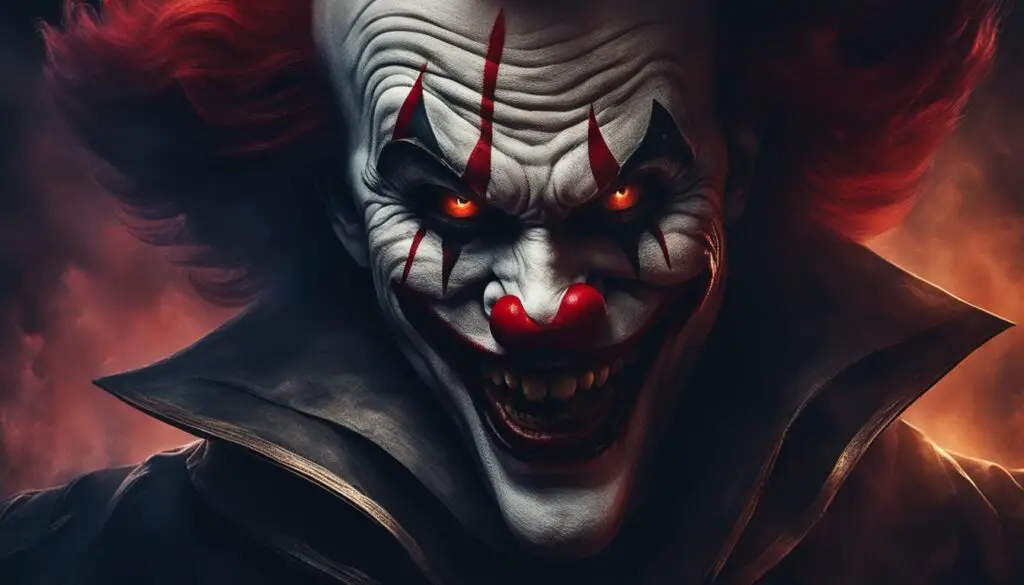Coulrophobia, the irrational fear of clowns, is a common phenomenon that can cause panic and discomfort. Many people wonder why clowns, who are meant to bring joy and laughter, can elicit such strong negative emotions. The fear of clowns, also known as coulrophobia, goes beyond a simple dislike or discomfort – it is a genuine phobia that affects a significant number of individuals.
One of the reasons people find clowns scary is the unsettling nature of their makeup. The exaggerated features, painted-on smiles, and colorful costumes disguise their true identity and feelings, creating an air of mystery and unease. The uncanny appearance of clowns, with their distorted facial features and exaggerated expressions, can trigger a fear response in the brain.
Clowns’ unpredictable behavior and mischievousness also contribute to their creepiness. Their ability to switch between laughter and mischief can create emotional discomfort and confusion for individuals. It is this combination of unpredictable behavior and unusual appearance that often leads to the development of coulrophobia.
Negative portrayals of clowns in popular culture have further fueled the fear. Evil clowns, such as Pennywise from Stephen King’s It and real-life serial killer John Wayne Gacy’s Pogo the Clown persona, have become iconic symbols of fear. Clown horror movies, with their terrifying depictions of clowns, have also played a significant role in perpetuating the negative perception of clowns and reinforcing the fear.
Key Takeaways
- The fear of clowns, called coulrophobia, is an irrational and common phenomenon.
- Clowns’ unsettling makeup and unpredictable behavior contribute to the fear.
- Negative portrayals of clowns in popular culture, including evil clown characters in movies, have further perpetuated the fear.
- Coulrophobia can cause panic and discomfort in individuals.
- Understanding the psychology and cultural factors behind the fear can help address and alleviate coulrophobia.
The Psychology Behind the Fear
The fear of clowns has a psychological basis. The clown’s makeup, with its distorted facial features, creates an uncanny and slightly off-putting appearance, triggering a fear response in the brain. Furthermore, a clown’s unpredictable behavior and ability to give mixed signals, such as a painted-on smile while frowning, creates emotional discomfort and unease. The disguise and unpredictability of clowns contribute to the fear and discomfort many people feel in their presence.
Studies have shown that the psychology of fear plays a significant role in the fear of clowns. The uncanny nature of their appearance, combined with their ability to give mixed signals, creates a sense of wariness and unease in individuals. These conflicting emotions can trigger the fear response and contribute to the overall discomfort associated with clowns.
Fear Response
When encountering a clown, individuals may experience a surge of adrenaline, increased heart rate, and heightened senses as part of the fear response. This physiological reaction is a primal instinct designed to protect us from potential threats. However, in the case of clowns, the fear response can be triggered by their distorted features and unpredictable behavior.
Emotional Discomfort
The emotional discomfort caused by clowns stems from the ambiguity and inconsistency they present. Their painted-on smile might appear friendly, but their actions can be contradictory and confusing. This creates a sense of unease and emotional discomfort, as individuals struggle to interpret the true intentions and emotions behind the clown’s exaggerated façade.
The Uncanny Nature
The uncanny nature of clowns can be attributed to the combination of familiar and unfamiliar elements in their appearance. Their exaggerated makeup and distorted features resemble that of a human, but the exaggeration and lack of authenticity create a sense of uneasiness. This uncanny valley effect can trigger feelings of fear and aversion.
Mixed Signals
Clowns often give mixed signals, blurring the line between humor and menace. Their painted-on smiles may indicate happiness, but their behavior can be mischievous and unpredictable. This inconsistency in their actions can leave individuals feeling uncertain and anxious, contributing to the fear associated with clowns.
In summary, the psychology behind the fear of clowns lies in the uncanny nature of their appearance, the mixed signals they convey, and the emotional discomfort they instill. Understanding these psychological factors can help shed light on the reasons why many people find clowns scary and contribute to efforts aimed at alleviating the fear of clowns.
Evil Clowns and Negative Portrayals in Popular Culture
Negative portrayals of clowns in popular culture have contributed to the widespread fear and negative perception of these characters. One notable association between clowns and evil or villainous figures can be traced back to the infamous serial killer John Wayne Gacy, who infamously performed as Pogo the Clown.
This association solidified the concept of evil clowns and provided inspiration for the portrayal of creepy and menacing clowns in various forms of media, such as horror movies, books, and television shows. One of the most iconic examples of an evil clown character is Pennywise, the shape-shifting entity from Stephen King’s novel It.

These negative portrayals have reinforced the fear and negative perception of clowns in society, instilling a deeper sense of discomfort and unease. The imagery of serial killer clowns and malevolent characters has permeated popular culture, leading to a lasting impact on public perception.
| Title | Release Date | Director |
|---|---|---|
| It | 2017 | Andy Muschietti |
| Killer Klowns from Outer Space | 1988 | Stephen Chiodo |
| Clown | 2014 | Jon Watts |
These films are just a few examples of how evil clowns have become a prominent theme in horror movies, further perpetuating the association between clowns and malevolence. The negative portrayals in popular culture continue to shape public perception and contribute to the fear and unease surrounding clowns.
Conclusion
The fear of clowns, also known as coulrophobia, is deeply rooted in the psychological discomfort caused by their appearance and behavior. Clowns with their uncanny makeup and exaggerated features trigger a fear response, while their unpredictable nature and mischievous acts create a sense of unease among many individuals. Moreover, negative portrayals of clowns as evil and menacing characters in popular culture, especially in horror movies, have further contributed to the fear and widespread unease surrounding clowns.
Understanding the underlying psychology behind the fear of clowns is crucial in comprehending why many people find them scary. By recognizing the uncanny and unsettling nature of clown makeup, as well as their erratic behavior and mixed signals, we can begin to unravel the sources of psychological discomfort associated with clowns. Additionally, negative portrayals of clowns in popular culture play a pivotal role in reinforcing the fear and negative perception surrounding these iconic figures.
To alleviate the fear of clowns, it is important to shed light on the psychological factors at play and challenge the negative stereotypes prevalent in popular culture. By addressing the root causes of coulrophobia, we can work towards creating a better understanding and acceptance of clowns, separating them from the negative associations perpetuated by horror movies and other forms of media. Ultimately, this could lead to a more nuanced and compassionate view of clowns in society.
FAQ
Why do people find clowns scary?
People find clowns scary due to various factors such as the unsettling nature of their makeup, the exaggerated features, and bizarre costumes. Their unpredictability and mischievous behavior also contribute to the fear.
What is coulrophobia?
Coulrophobia is the irrational fear of clowns. It is a common phobia that can cause panic and discomfort in individuals who suffer from it.
What is the psychological basis for the fear of clowns?
The fear of clowns has a psychological basis. The clown’s makeup, with its distorted facial features, triggers a fear response in the brain. The clown’s unpredictable behavior and ability to give mixed signals create emotional discomfort and unease.
How have negative portrayals of clowns in popular culture contributed to the fear?
Negative portrayals of clowns in popular culture have had a significant impact on the fear of clowns. The association between clowns and evil or villainous characters, such as serial killer John Wayne Gacy, has solidified the concept of evil clowns. This association has inspired creepy and menacing clown characters in horror movies and other media, reinforcing the fear and negative perception of clowns.
What is the impact of clown horror movies on the fear of clowns?
Clown horror movies have perpetuated the fear of clowns by portraying them as creepy and menacing characters. The iconic example of an evil clown character is Pennywise from Stephen King’s It, which has further solidified the negative perception of clowns in society.
Please feel free to contact us if you have any further questions or concerns!

